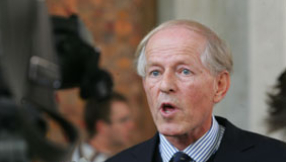The Archbishop of Canterbury was at Coventry Cathedral this week to preach on the theme of reconciliation.
Speaking at the Faith in Conflict conference, Justin Welby said reconciliation was about "recognition of diversity and a transformation of destructive conflict to creativity".
"It holds the tensions and challenges of difference and confronts us with them, forcing us to a new way of life that accepts the power and depth and radicality of the work of the Holy Spirit in our conversions," he said.
Coventry Cathedral has come to be a symbol of reconciliation after being reconstructed following its destruction in World War Two.
The Archbishop said the conference was taking place precisely because "conflict is so much part of our lives", but added that conflict was not necessarily wrong.
"Our fear of it, our sense of it being wasted time and effort is wrong," he said.
"So often we seek like mindedness so that we can get on with the job of worship, of making disciples, of serving other human beings.
"Because conflict in the church is time consuming and destructive, we turn from facing it and instead seek those with whom we agree."
He challenged the church to "manage diversity and grow with it", and be unified around a shared faith in God.
"Conflict arises from the diversity in which we have been created," he said.
"When we seek to find a way of life that avoids it we deny the three realities of our fallenness, our present diversity, and the tension between the realised present and anticipated salvation of our futures."
He continued: "In the old expression, we can choose our friends but we are stuck with our family. And so, by calling on God we are bound into a fellowship of being heralds of the reconciliation we have received. We had better get used to it because it lasts for ever."
Without reconciliation, the Church would be hindered in its mission and evangelism, but also failing as church, the Archbishop warned.
He admitted reconciliation could at times be "painful" and slow but added that a failure in reconciliation would be indicative of a church that was "not open to the love of God".
"Success has many faces, but all of them are rooted in finding the love of God at work in us and seeing it in others," he said.
"We are many tribes, but one people. For that to have any possibility of success the journeying must be in truth, responding to the Spirit of God in us calling to the Spirit of God in each other.
"In journeying we must speak to each other. Silence is not peace."
Beyond the Church, the Archbishop encouraged Christians to be reconcilers within society and creation, working to support the environment, families, and communities.
He concluded: "If we can name and listen, be in conflict but not destruction, take the crooked straight path of reconciliation, we can establish a pattern and model of trust filled living drawing on the grace of God, a model that changes the world."













